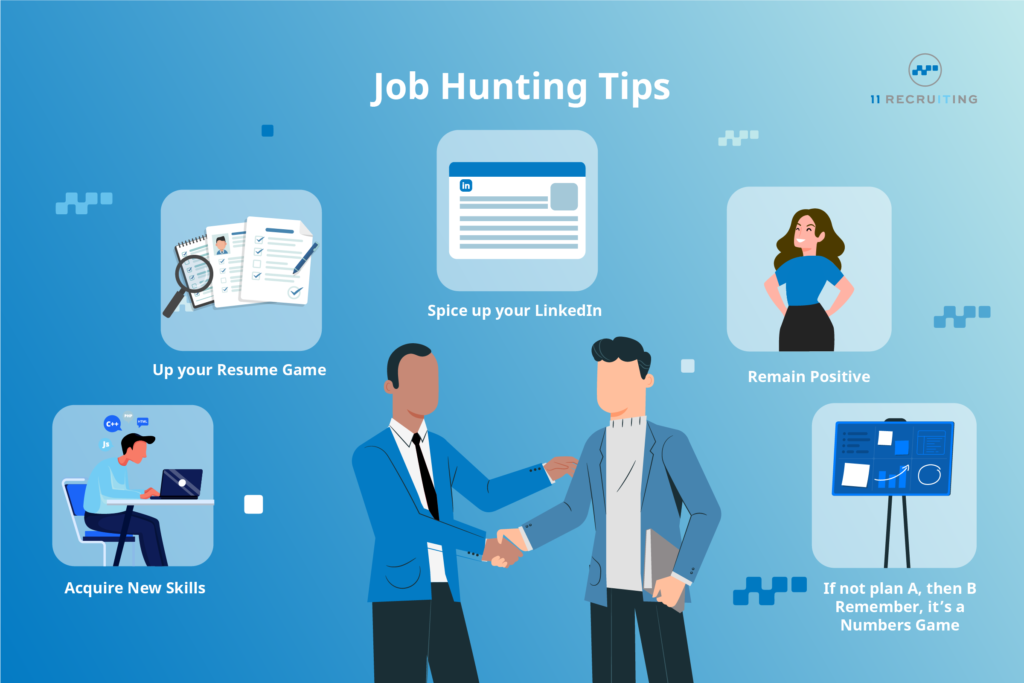
Have you been searching for a job for what feels like an eternity? Look, I get it. Job Hunting is a pain. Each rejection can feel like a bullet to your confidence, self-esteem, and future.
However, the good news is that your dream career might not be as out of reach as you think. There’s plenty you can do from your side to stack the odds of landing one in your favor. So let’s get into the best job hunting tips and tricks you can employ to get employed.
Frequently Asked Questions
How can I make job hunting easier?
You can job hunt effectively by knowing exactly the kind of job you want and then devising a solid strategy to get it. Choose only those companies that you know you’re a good fit for. Customize your resume so it perfectly matches your ideal company’s requirements.
How to get a job I really want?
The best way to get a job you really want is to be the ideal candidate companies are looking for. Gain relevant experiences and abilities. If you have these, all you need to do is create a solid CV and LinkedIn profile to sell your skills.
For tech companies, you might have to prepare a portfolio of your previous work or take an examination to verify your skills. Certifications for your skills can make job hunting way easier and could possibly make the process faster.
How do you strategically hunt jobs?
Strategic job hunting involves the use various methods of reaching out to employers, including your network, employment recruitment agencies, direct employer contact, professional associations, and job fairs.
Job Hunting Tips

Up your Resume Game
The resume is the biggest weapon you have in your job hunting arsenal, and you’d be crazy not to use it well. To make a great resume, first understand what your potential employer is looking for. Then put yourself in their shoes – see what the ideal candidate looks like from their point of view.
Then craft your Curriculum Vitae to resemble this ideal candidate. Highlight relevant experiences, skills, and achievements so the recruiter can spot them easily while scanning your resume. If you play your cards right, you should be expecting a call from your future company soon.
Acquire New Skills
If you’re applying for jobs but haven’t received a call for an interview yet, don’t sit around and wait. Start learning skills relevant to your role. The more skills you have, the more attractive you’ll look to recruiters.
Recruiters can make the burden of job hunting easier. They match you with the best opportunities for your skill set. It’s best to list down your interests and skills so recruiters can find the best job opening for you.
Spice up your LinkedIn
There are many things you can do to improve your Linkedin profile. For one, write an appealing bio that looks enticing to hiring managers (use the tips we gave in the resume section). Also reflect on your work history, and figure out key achievements you’ve had throughout your career. Add these in the job summary section as well as in the Accomplishment section of the LinkedIn profile.
Additionally, ask your colleagues to give you strong recommendations on the platform. These will go a long way in making your profile extremely attractive to future employers.
IT managers don’t want to spend hours hunting for the right candidate. They have business to take care of and current employees to manage. If you’ve made a strong profile, they’ll be ecstatic to reach out to you so they can get on with their day.
Remain Positive
Rejection from job hunting sucks. We’ve all heard crickets while waiting for a reply from a company we desperately wanted to get into. But what separates the people who get jobs from those that don’t is the right mindset.
People who get a job never give up. Ever. They remain positive and keep trying till they get what they want. So stay positive (of course, easier said than done), and keep searching.
If not plan A, then B
If your job hunt isn’t yielding you good results, maybe it’s time to step back and re-evaluate your current plan of action. Ask yourself – what is it about my approach that isn’t working?
Maybe you need to change your CV. Perhaps your LinkedIn isn’t as impressive as you imagined it to be. Or maybe you need different skills and experiences before your dream employer will roll out the welcome carpet for you. If plan A doesn’t work, find out the bottleneck in your strategy and get to work fixing it.
Remember, it’s a Numbers Game
Don’t expect to get a job or land an interview if you’ve just sent 3-4 CVs. That’s not enough; you need to send much, much more.
If you’re short on time, sending out at least one CV a day is a good place to start. If you can send two or three, all the better. The more you want a job, the more effort and time you need to spend on getting one.
Want an easier way to job hunt? Submit your resume today

